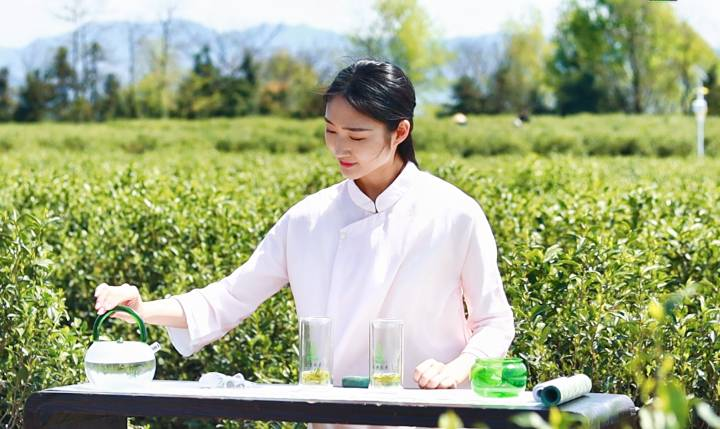 When the Qingming Festival (or Tomb-sweeping Day) is approaching, Xinchang enters its busiest season as a major producer of Giant Buddha Longjing Tea. These days, the county features not only traditional tea producers, but also a group of "tea masters" who promote the tea locally.
When the Qingming Festival (or Tomb-sweeping Day) is approaching, Xinchang enters its busiest season as a major producer of Giant Buddha Longjing Tea. These days, the county features not only traditional tea producers, but also a group of "tea masters" who promote the tea locally.
Wu Yumei, age 29, is the most famous representative of the brand, as well as a tea farmer who has become prosperous taking part in rural revitalisation.

Wu Yumei
In 2013, Lyu Meiping was teaching tea art when Wu Yumei took one of her classes, and immediately drew her attention.

Wu Yumei and Lyu Meiping
Wu Yumei trained for 8 years to become a national Level I Tea Master, and now endorses Giant Buddha Longjing Tea in her hometown.
Wu Yumei's father is a tea farmer, and her family owns a tea garden, but she had never thought of inheriting the family business. Young people, in her view, do not want to follow in their parents' footsteps, and the life of a tea farmer is hard. She says, "When I was a child, I often saw my parents pan tea late into the night. The tea pan was hot, and my father's hands were rough with calluses.”
Attending Xinchang College at Zhejiang Open University, where she gained junior-college and undergraduate degree, enabled her quickly to become a star in her county through tea-specialist training and competitions.
It usually takes 20 years for a tea specialist to reach the national level I, but Wu Yumei needed only 8.
In 2016, Zhejiang Province held a vocational skills competition for tea artists at which Wu Yumei came first. That year, she also reached the finals of the third National Tea-artist Professional-skills Competition, representing Zhejiang Province.
In 2021, she was named a "Zhejiang Craftsperson", and appeared frequently in local media to promote Giant Buddha Longjing Tea.
In Xinchang's "China Tea Market" Wu Yumei opened her "Meiyuan Tea Studio" to offer tea-related courses.
The studio has been designated a training centre by the Xinchang County Agriculture and Rural Affairs Bureau, and teaches tea art and tea-related subjects in government institutions, enterprises, and communities, on campuses, and in remote mountain villages and other rural areas. Training is given with local cooperation, and so far nearly 6,000 students have been trained in tea art and evaluation.
"Ten years ago, young people had no interest in traditional tea production," says Lyu Meiping. “Now, second and third-generation tea farmers in their 20s, like Yumei, are being motivated to return home, take over the tea gardens of their parents, and apply what they have learned at school. I am very glad to see this.”
What is rural revitalisation? What is common prosperity? To Wu Yumei, they are not just about increasing yields and incomes. They are about the yearning of young people for better lives, and happiness.
By Zhejiang OU